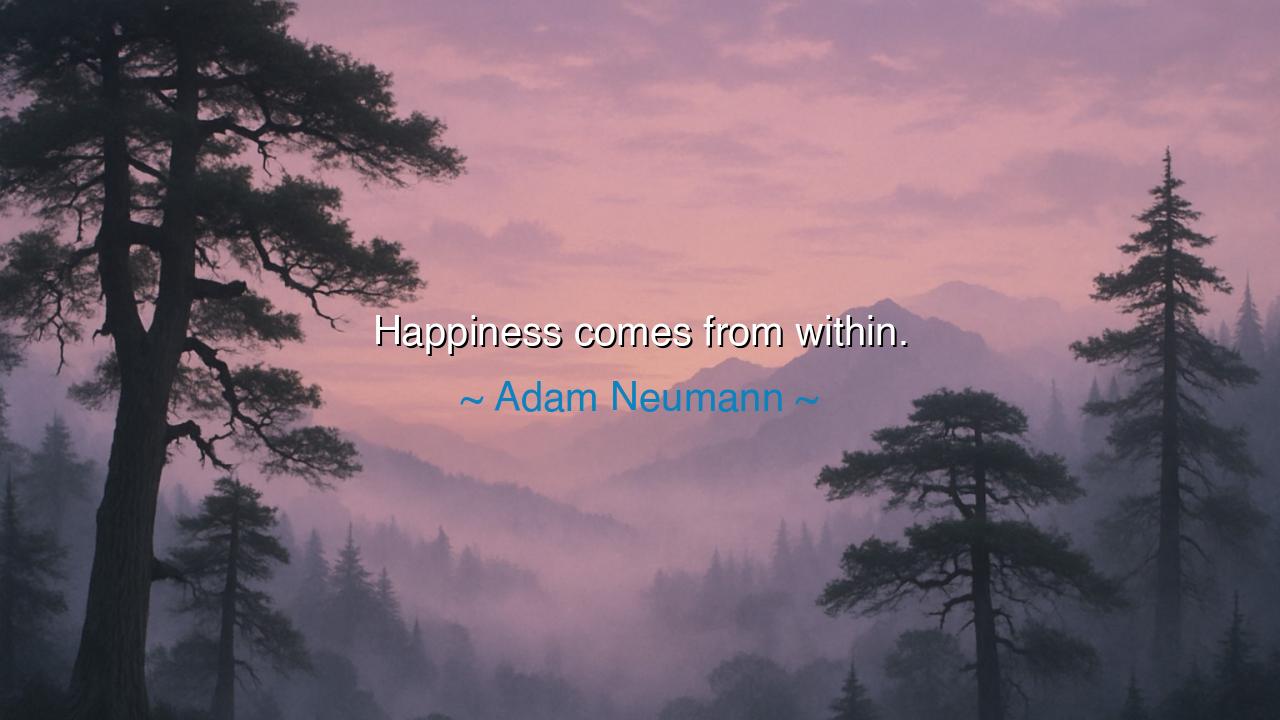
Happiness comes from within.






In the words of Adam Neumann, “Happiness comes from within.” Though the phrase may sound simple, it carries a truth as ancient as humanity itself — that joy, peace, and contentment are not gifts granted by the world, but treasures discovered within the soul. Neumann, the visionary entrepreneur behind WeWork, spoke these words after a journey marked by both great triumph and humbling failure. Having tasted the heights of wealth and fame, he came to realize what the wise of old had always known: external success cannot fill the emptiness of an unquiet spirit. True happiness is not built from gold or applause, but drawn from the still waters of the heart.
The origin of this idea predates Neumann by millennia. The philosophers of Greece and the sages of the East all proclaimed the same truth in different tongues. Socrates declared that happiness depends not on what one possesses, but on how one lives. The Buddha taught that joy arises not from clinging to the world, but from releasing it. Marcus Aurelius, emperor and philosopher, wrote that the soul becomes calm when it ceases to wander outside itself. These voices, though separated by centuries, form one chorus: that the kingdom of happiness is not to be found in fortune or circumstance, but within the sanctuary of the mind and spirit.
Neumann’s words, though modern, echo this timeless wisdom in a world that has forgotten it. His life is a parable of the modern age — a man who built towers of glass and enterprise, only to find that inner emptiness cannot be filled by outer expansion. In the frenzy of creation and ambition, he, like many, discovered that the pursuit of success without peace leads to disillusionment. When the applause fades and the wealth settles into silence, one is left facing the only question that matters: “Am I whole within myself?” Thus, his quote is both confession and revelation — a reminder that happiness is not found in what we build, but in who we become.
Consider the tale of Diogenes, the philosopher who lived in a barrel, owning nothing, yet declaring himself the happiest of men. When Alexander the Great visited him and asked what he could do for him, Diogenes merely replied, “Step aside — you are blocking my sun.” The conqueror, who held dominion over nations, was humbled by a man who ruled only himself. For Diogenes had discovered the essence of happiness — self-sufficiency, the light that shines from within and needs no external flame. Such is the power of inner peace: it renders kings and beggars equal.
“Happiness comes from within” is not merely a statement of comfort; it is a discipline, a call to self-mastery. It demands that we turn inward, to confront the restlessness, fear, and longing that drive us. The mind that depends on praise will despair in criticism; the heart that depends on possession will wither in loss. To find happiness within is to make oneself unshakable, like a mountain unmoved by wind. This inner strength, once found, is freedom — for then no change of fortune can steal one’s peace.
Yet the path inward is not one of isolation. To look within is not to reject the world, but to engage it from a place of clarity and balance. When one’s joy is rooted in the soul, rather than circumstance, even the simplest acts — a breath of morning air, a shared smile, the warmth of sunlight — become radiant. Such a person lives not in constant hunger for more, but in gratitude for what already is. And in gratitude, the heart becomes inexhaustibly rich.
The lesson, then, is this: seek not happiness outside yourself, for it cannot be bought, earned, or given. Turn inward each day — through reflection, prayer, or silence — and listen to the voice beneath the noise of the world. Nurture peace in your thoughts, kindness in your actions, and simplicity in your desires. These are the true foundations of happiness, unshaken by success or failure.
So remember, O listener: happiness is not a destination, but a dwelling. It is not found in the rise of fortune, but in the stillness of the soul. The man who governs his inner world is richer than emperors; the woman who carries peace in her heart walks freer than any queen. As Adam Neumann discovered — and as the ancients have long taught — the treasure you seek is already within you. It waits in the quiet spaces of your being, ready to be awakened, if only you have the courage to look inward and claim it.






AAdministratorAdministrator
Welcome, honored guests. Please leave a comment, we will respond soon